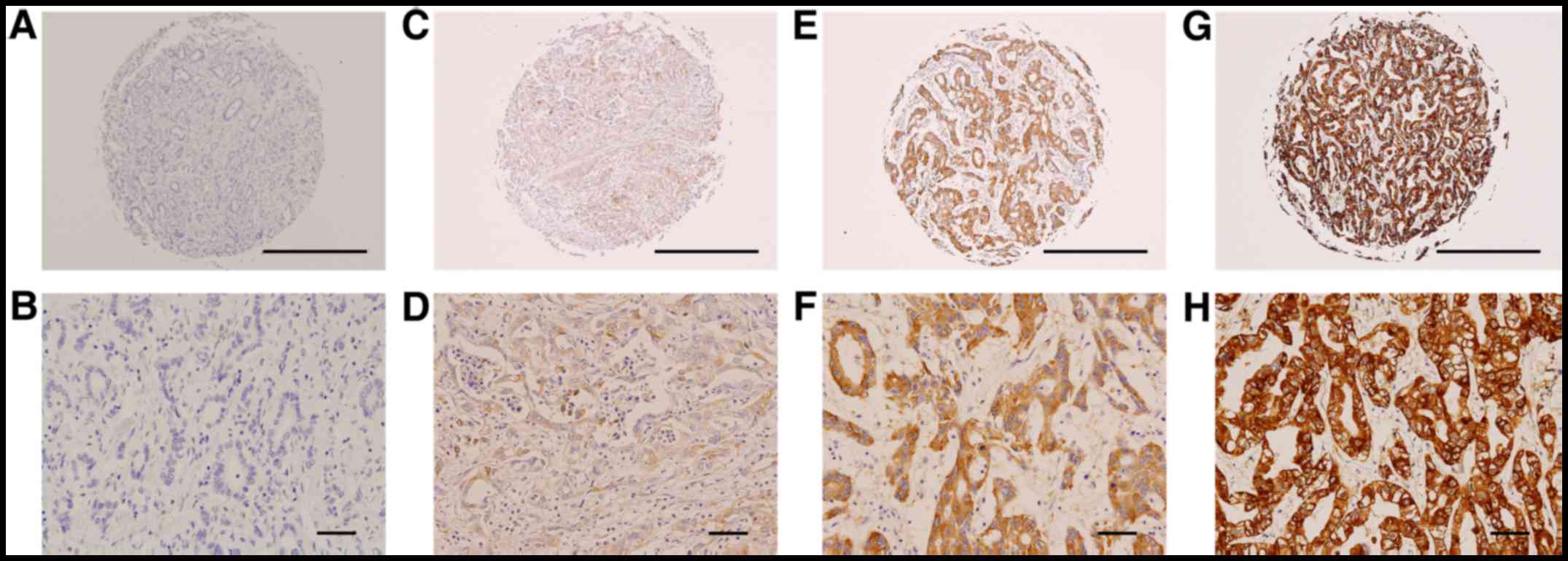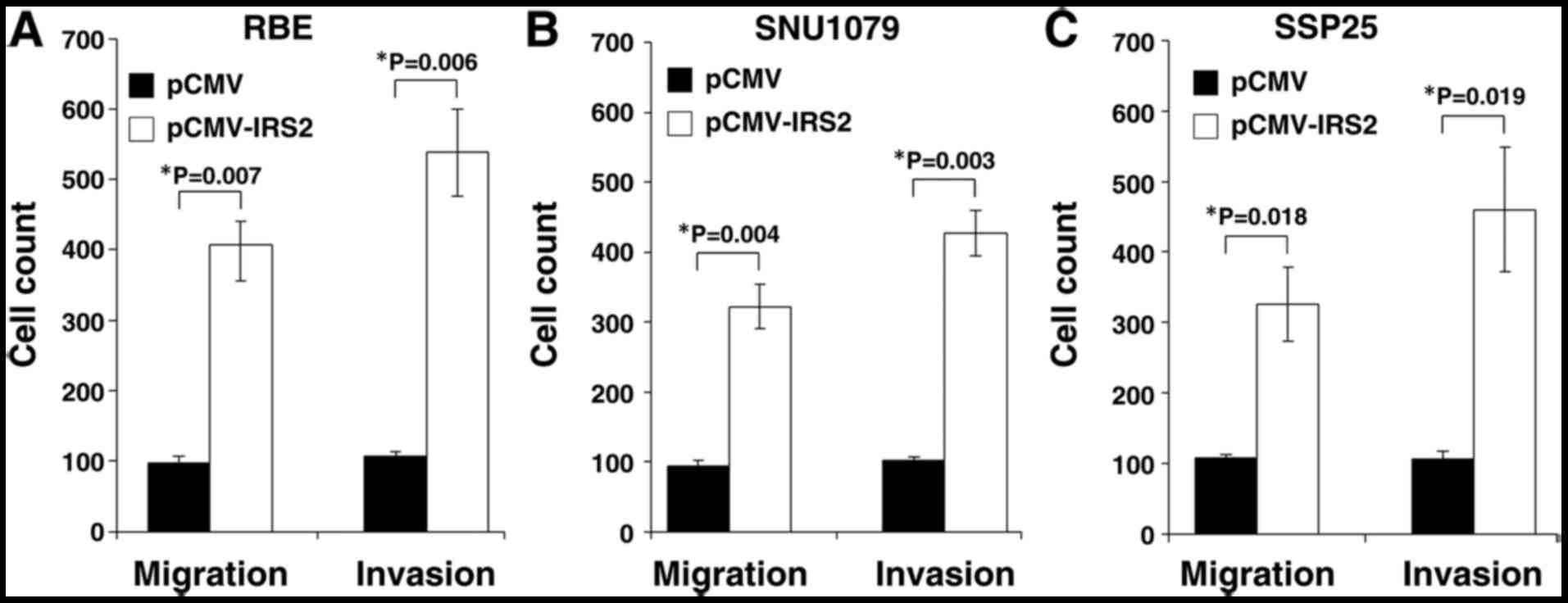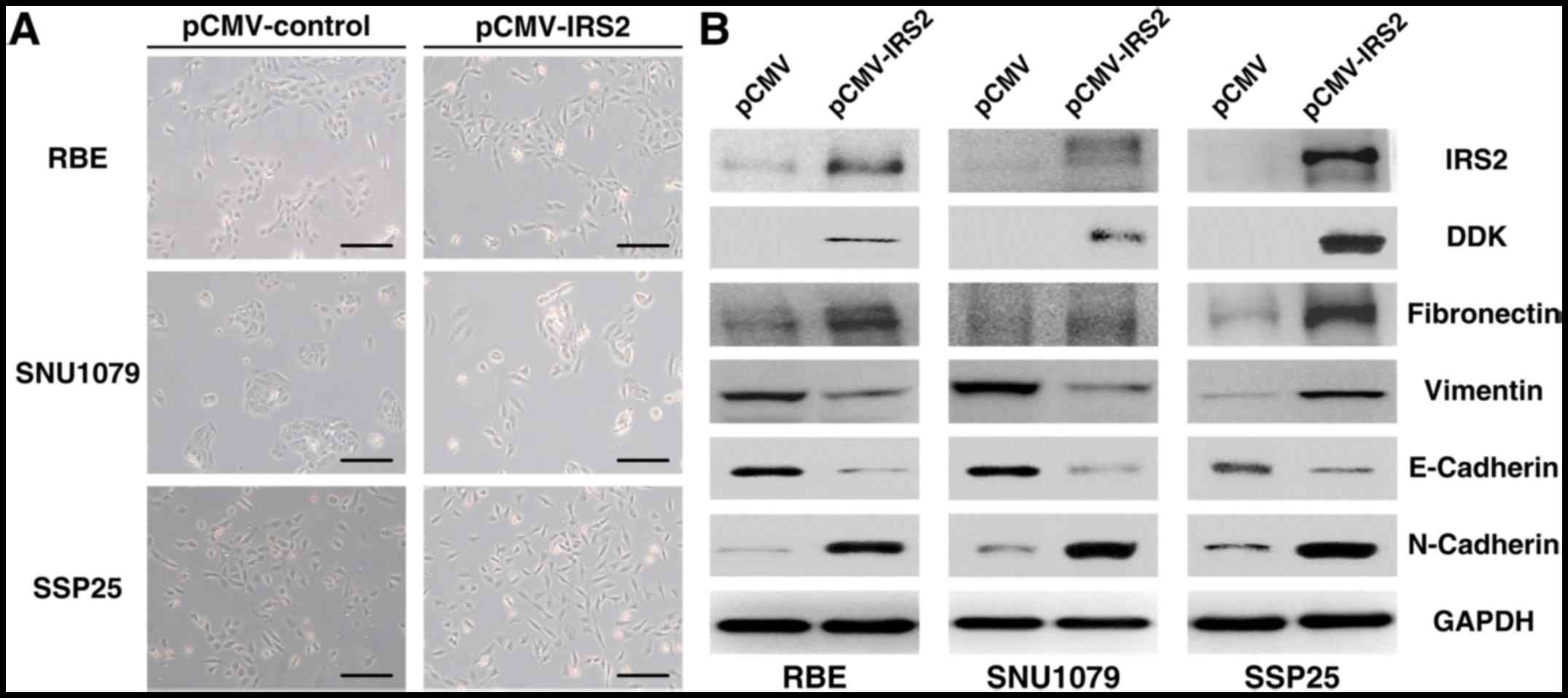|
1
|
Singh P, Alex JM and Bast F: Insulin
receptor (IR) and insulin-like growth factor receptor 1 (IGF-1R)
signaling systems: Novel treatment strategies for cancer. Med
Oncol. 31:8052014. View Article : Google Scholar : PubMed/NCBI
|
|
2
|
Kasper JS and Giovannucci E: A
meta-analysis of diabetes mellitus and the risk of prostate cancer.
Cancer Epidemiol Biomarkers Prev. 15:2056–2062. 2006. View Article : Google Scholar : PubMed/NCBI
|
|
3
|
Dearth RK, Cui X, Kim HJ, Hadsell DL and
Lee AV: Oncogenic transformation by the signaling adaptor proteins
insulin receptor substrate (IRS)-1 and IRS-2. Cell Cycle.
6:705–713. 2007. View Article : Google Scholar : PubMed/NCBI
|
|
4
|
Boissan M, Beurel E, Wendum D, Rey C,
Lécluse Y, Housset C, Lacombe ML and Desbois-Mouthon C:
Overexpression of insulin receptor substrate-2 in human and murine
hepatocellular carcinoma. Am J Pathol. 167:869–877. 2005.
View Article : Google Scholar : PubMed/NCBI
|
|
5
|
Esposito DL, Verginelli F, Toracchio S,
Mammarella S, De Lellis L, Vanni C, Russo A, Mariani-Costantini R
and Cama A: Novel insulin receptor substrate 1 and 2 variants in
breast and colorectal cancer. Oncol Rep. 30:1553–1560. 2013.
View Article : Google Scholar : PubMed/NCBI
|
|
6
|
Rozengurt E, Sinnett-Smith J and Kisfalvi
K: Crosstalk between insulin/insulin-like growth factor-1 receptors
and G protein-coupled receptor signaling systems: A novel target
for the antidiabetic drug metformin in pancreatic cancer. Clin
Cancer Res. 16:2505–2511. 2010. View Article : Google Scholar : PubMed/NCBI
|
|
7
|
Hsing AW, Sakoda LC and Chua S Jr:
Obesity, metabolic syndrome, and prostate cancer. Am J Clin Nutr.
86:s843–s857. 2007. View Article : Google Scholar : PubMed/NCBI
|
|
8
|
Dziadziuszko R, Camidge DR and Hirsch FR:
The insulin-like growth factor pathway in lung cancer. J Thorac
Oncol. 3:815–818. 2008. View Article : Google Scholar : PubMed/NCBI
|
|
9
|
Jerome L, Alami N, Belanger S, Page V, Yu
Q, Paterson J, Shiry L, Pegram M and Leyland-Jones B: Recombinant
human insulin-like growth factor binding protein 3 inhibits growth
of human epidermal growth factor receptor-2-overexpressing breast
tumors and potentiates herceptin activity in vivo. Cancer Res.
66:7245–7252. 2006. View Article : Google Scholar : PubMed/NCBI
|
|
10
|
Nahta R, Yu D, Hung MC, Hortobagyi GN and
Esteva FJ: Mechanisms of disease: Understanding resistance to
HER2-targeted therapy in human breast cancer. Nat Clin Pract Oncol.
3:269–280. 2006. View Article : Google Scholar : PubMed/NCBI
|
|
11
|
Ouban A, Muraca P, Yeatman T and Coppola
D: Expression and distribution of insulin-like growth factor-1
receptor in human carcinomas. Hum Pathol. 34:803–808. 2003.
View Article : Google Scholar : PubMed/NCBI
|
|
12
|
Reuveni H, Flashner-Abramson E, Steiner L,
Makedonski K, Song R, Shir A, Herlyn M, Bar-Eli M and Levitzki A:
Therapeutic destruction of insulin receptor substrates for cancer
treatment. Cancer Res. 73:4383–4394. 2013. View Article : Google Scholar : PubMed/NCBI
|
|
13
|
Taniguchi CM, Emanuelli B and Kahn CR:
Critical nodes in signalling pathways: Insights into insulin
action. Nat Rev Mol Cell Biol. 7:85–96. 2006. View Article : Google Scholar : PubMed/NCBI
|
|
14
|
Cai D, Dhe-Paganon S, Melendez PA, Lee J
and Shoelson SE: Two new substrates in insulin signaling, IRS5/DOK4
and IRS6/DOK5. J Biol Chem. 278:25323–25330. 2003. View Article : Google Scholar : PubMed/NCBI
|
|
15
|
Day E, Poulogiannis G, McCaughan F,
Mulholland S, Arends MJ, Ibrahim AE and Dear PH: IRS2 is a
candidate driver oncogene on 13q34 in colorectal cancer. Int J Exp
Pathol. 94:203–211. 2013.PubMed/NCBI
|
|
16
|
Yuan TL and Cantley LC: PI3K pathway
alterations in cancer: Variations on a theme. Oncogene.
27:5497–5510. 2008. View Article : Google Scholar : PubMed/NCBI
|
|
17
|
Rosner A, Miyoshi K, Landesman-Bollag E,
Xu X, Seldin DC, Moser AR, MacLeod CL, Shyamala G, Gillgrass AE and
Cardiff RD: Pathway pathology: Histological differences between
ErbB/Ras and Wnt pathway transgenic mammary tumors. Am J Pathol.
161:1087–1097. 2002. View Article : Google Scholar : PubMed/NCBI
|
|
18
|
Dearth RK, Cui X, Kim HJ, Kuiatse I,
Lawrence NA, Zhang X, Divisova J, Britton OL, Mohsin S, Allred DC,
et al: Mammary tumorigenesis and metastasis caused by
overexpression of insulin receptor substrate 1 (IRS-1) or IRS-2.
Mol Cell Biol. 26:9302–9314. 2006. View Article : Google Scholar : PubMed/NCBI
|
|
19
|
Byron SA, Horwitz KB, Richer JK, Lange CA,
Zhang X and Yee D: Insulin receptor substrates mediate distinct
biological responses to insulin-like growth factor receptor
activation in breast cancer cells. Br J Cancer. 95:1220–1228. 2006.
View Article : Google Scholar : PubMed/NCBI
|
|
20
|
Gibson SL, Ma Z and Shaw LM: Divergent
roles for IRS-1 and IRS-2 in breast cancer metastasis. Cell Cycle.
6:631–637. 2007. View Article : Google Scholar : PubMed/NCBI
|
|
21
|
Mardilovich K and Shaw LM: Hypoxia
regulates insulin receptor substrate-2 expression to promote breast
carcinoma cell survival and invasion. Cancer Res. 69:8894–8901.
2009. View Article : Google Scholar : PubMed/NCBI
|
|
22
|
Nagle JA, Ma Z, Byrne MA, White MF and
Shaw LM: Involvement of insulin receptor substrate 2 in mammary
tumor metastasis. Mol Cell Biol. 24:9726–9735. 2004. View Article : Google Scholar : PubMed/NCBI
|
|
23
|
Liu TT, You HL, Weng SW, Wei YC, Eng HL
and Huang WT: Recurrent amplification at 13q34 targets at CUL4A,
IRS2, and TFDP1 As an independent adverse prognosticator in
intrahepatic cholangiocarcinoma. PLoS One. 10:e01453882015.
View Article : Google Scholar : PubMed/NCBI
|
|
24
|
Ma Z, Gibson SL, Byrne MA, Zhang J, White
MF and Shaw LM: Suppression of insulin receptor substrate 1 (IRS-1)
promotes mammary tumor metastasis. Mol Cell Biol. 26:9338–9351.
2006. View Article : Google Scholar : PubMed/NCBI
|
|
25
|
Zhao H, Desai V, Wang J, Epstein DM,
Miglarese M and Buck E: Epithelial-mesenchymal transition predicts
sensitivity to the dual IGF-1R/IR inhibitor OSI-906 in
hepatocellular carcinoma cell lines. Mol Cancer Ther. 11:503–513.
2012. View Article : Google Scholar : PubMed/NCBI
|
|
26
|
Denduluri SK, Idowu O, Wang Z, Liao Z, Yan
Z, Mohammed M, Ye J, Wei Q, Wang J, Zhao L and Luu HH: Insulin-like
growth factor (IGF) signaling in tumorigenesis and the development
of cancer drug resistance. Genes Dis. 2:13–25. 2015. View Article : Google Scholar : PubMed/NCBI
|
|
27
|
Motallebnezhad M, Aghebati-Maleki L,
Jadidi-Niaragh F, Nickho H, Samadi-Kafil H, Shamsasenjan K and
Yousefi M: The insulin-like growth factor-I receptor (IGF-IR) in
breast cancer: Biology and treatment strategies. Tumour Biol.
37:11711–11721. 2016. View Article : Google Scholar : PubMed/NCBI
|
|
28
|
Wang R, Li H, Guo X, Wang Z, Liang S and
Dang C: IGF-I induces epithelial-to-mesenchymal transition via the
IGF-IR-Src-MicroRNA-30a-E-cadherin pathway in nasopharyngeal
carcinoma cells. Oncol Res. 24:225–231. 2016. View Article : Google Scholar : PubMed/NCBI
|
|
29
|
Li H, Batth IS, Qu X, Xu L, Song N, Wang R
and Liu Y: IGF-IR signaling in epithelial to mesenchymal transition
and targeting IGF-IR therapy: Overview and new insights. Mol
Cancer. 16:62017. View Article : Google Scholar : PubMed/NCBI
|
|
30
|
Hoang CD, Zhang X, Scott PD, Guillaume TJ,
Maddaus MA, Yee D and Kratzke RA: Selective activation of insulin
receptor substrate-1 and −2 in pleural mesothelioma cells:
Association with distinct malignant phenotypes. Cancer Res.
64:7479–7485. 2004. View Article : Google Scholar : PubMed/NCBI
|
|
31
|
Kim B, van Golen CM and Feldman EL:
Insulin-like growth factor-I signaling in human neuroblastoma
cells. Oncogene. 23:130–141. 2004. View Article : Google Scholar : PubMed/NCBI
|
|
32
|
Wittman M, Carboni J, Attar R,
Balasubramanian B, Balimane P, Brassil P, Beaulieu F, Chang C,
Clarke W, Dell J, et al: Discovery of a
(1H-benzoimidazol-2-yl)-1H-pyridin-2-one (BMS-536924) inhibitor of
insulin-like growth factor I receptor kinase with in vivo antitumor
activity. J Med Chem. 48:5639–5643. 2005. View Article : Google Scholar : PubMed/NCBI
|
|
33
|
Pitts TM, Tan AC, Kulikowski GN, Tentler
JJ, Brown AM, Flanigan SA, Leong S, Coldren CD, Hirsch FR,
Varella-Garcia M, et al: Development of an integrated genomic
classifier for a novel agent in colorectal cancer: Approach to
individualized therapy in early development. Clin Cancer Res.
16:3193–3204. 2010. View Article : Google Scholar : PubMed/NCBI
|
|
34
|
Miyamoto S, Nakamura M, Shitara K,
Nakamura K, Ohki Y, Ishii G, Goya M, Kodama K, Sangai T, Maeda H,
et al: Blockade of paracrine supply of insulin-like growth factors
using neutralizing antibodies suppresses the liver metastasis of
human colorectal cancers. Clin Cancer Res. 11:3494–3502. 2005.
View Article : Google Scholar : PubMed/NCBI
|
|
35
|
Goya M, Miyamoto S, Nagai K, Ohki Y,
Nakamura K, Shitara K, Maeda H, Sangai T, Kodama K, Endoh Y, et al:
Growth inhibition of human prostate cancer cells in human adult
bone implanted into nonobese diabetic/severe combined
immunodeficient mice by a ligand-specific antibody to human
insulin-like growth factors. Cancer Res. 64:6252–6258. 2004.
View Article : Google Scholar : PubMed/NCBI
|

















